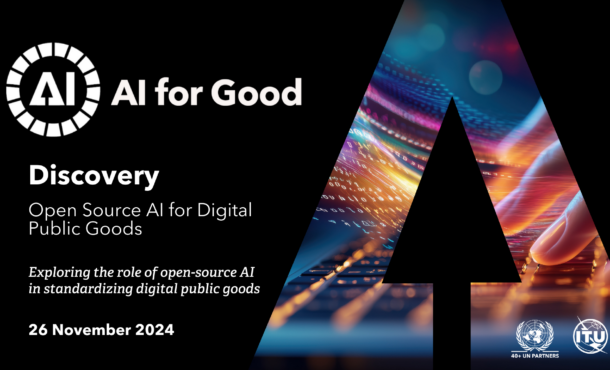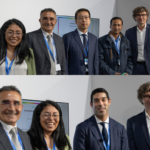Neurotechnologies, AI, and Human Rights

- 19 December 2023
by Elizaveta Agurbash; edited by Alena Radziukevich
In the dynamic intersection of neuroscience, artificial intelligence, and ethical considerations, a remarkable evolution is underway. The convergence of Neurotechnologies and AI heralds a new era in understanding brain functionality, promising revolutionary breakthroughs in therapeutics, assistive devices, and human-machine interfaces across diverse sectors. However, as the potential of these advancements unfolds, so do critical questions concerning human rights and dignity.
The latest AI for Good webinar called “Neurotechnologies, AI and Human Rights” shed light on the delicate balance between innovation and ethical responsibility. Leading experts from the Mexican Association of Neuroethics, IBM T.J. Watson Research Lab, United Nations, and Zürich University of Applied Sciences came together to pave a route that upholds advancements while safeguarding essential human values.
Cultivating Empathy in Neurotechnology
In the remarkable realm where neuroscience converges with technological innovation, the cultivation of empathy stands as a profound imperative. Understanding and embracing the human experience, emotions, and diverse perspectives are crucial elements shaping the ethical landscape of neurotechnological advancements.
Dr. Karen Herrera-Ferrá and her team at the Mexican Association of Neuroethics (AMNE) analyze domestic medical, legal, social, and ethnocultural factors, including recurrent violent behavior. They also delve into global neuroethics across cultures and human rights concerning the brain and mind.
Sharing the latest insights, Dr. Herrera-Ferrá emphasized the vital role of acknowledging cultural and societal differences in comprehending fundamental human traits such as emotions, free will, and identity. In a world where only a fraction of the global populace resides in nations leading neurotechnology developments—approximately 32%—there arises a significant risk. This risk lies in the oversight or neglect of the rich tapestry of human experiences and values. Such oversight could potentially hinder the holistic and inclusive development of neurotechnologies that genuinely serve and resonate with the entirety of humanity.
“The ways we understand the human traits will shape attitude towards how beneficial or dangerous for society and the world the replication of it is in AI,” shared Karen Herrera-Ferrá, a Founder and former President of the AMNE.
Beyond the Horizon: The Dual Nature of Neurotechnologies in Healthcare
At this pivotal crossroads within healthcare’s evolution, the emergence of neurotechnologies and AI heralds a landscape brimming with transformative potential while navigating intricate ethical considerations. Within this dynamic sphere lies a duality shaping the trajectory of innovation, revealing both the promises and perils that accompany these advancements. As we delve into this domain, a profound interplay between benefits and challenges unfolds.
On this note, Dr. Sara Berger from IBM Research shared the research insights into the positive impact that neurotechnologies and AI can have on healthcare. Dr. Berger unveiled a compelling vision encompassing new diagnostic tools, revolutionary therapeutics, and an enriched comprehension of human experiences facilitated by these innovative technologies. Yet, amid these groundbreaking possibilities, she aptly highlighted the ethical precipice—privacy concerns, issues of autonomy, potential manipulation, and biases—that underscore the urgency for responsible development and application. Dr. Berger’s discourse unequivocally emphasizes the pivotal role of ethical vigilance in navigating these advancements toward a morally conscious healthcare landscape.
“You have all of this complex data and you want to use AI to discover more about nervous system and to process things better and this will only increase,” mentioned Sara Berger, a Research Staff Member at IBM Research.
Unlocking Minds: the Global Dialogue on Human Rights in Neurotechnologies
Recognizing education as a pivotal factor, the discussion underscored its crucial role in fostering comprehension of neurotechnologies and human rights principles. The panelists astutely acknowledged the inherent tensions between fostering innovation and enforcing regulation. Yet, they fervently advocated for a forward-thinking governance approach—one that proactively anticipates challenges rather than merely reacting to them. Within their discourse, they emphasized not only the vast potential of these nascent technologies but also the formidable hurdles that necessitate cautious and inclusive navigation
Thus, Dr. Milena Costas Trascasas from the UN Human Rights Council’s Advisory Committee, shared the latest news and focus on ongoing international initiatives to develop governance frameworks for neurotechnologies. She emphasized the importance of human rights norms in ensuring that these technologies are developed for the benefit of humanity while minimizing potential abuses.
“While neurotechnologies could positively impact mental health and scientific understanding, anticipating and mitigating threats will be important to guide their development and use for public benefit in a way respectful of human values and diversity globally, ” added Milena Costas Trascasas, a Chair of the UN Human Rights Council’s Advisory Committee.
The panelists agreed that addressing the complex issues surrounding neurotechnologies requires a multistakeholder, multilevel approach involving not just technology developers, but also policymakers, regulators, civil society, and communities.
The AI for Good webinar shed light on the responsible development of neurotechnologies and their intersection with artificial intelligence. It emphasized the need for proactive and anticipatory governance, consideration of cultural diversity, respect for human rights, and the involvement of various stakeholders for the successful and beneficial integration of these technologies into society.
While advancements in AI and neuroscience promise significant benefits, they also raise valid concerns about their potential impact on human dignity and rights. In response to these concerns, voices from academia, international organizations, and the private sector have called for responsible governance in this burgeoning field. The webinar aimed to explore the consequences of integrating AI with neurotechnologies, shedding light on existing initiatives and strategies to foster their development in alignment with established and emerging frameworks for the protection of human rights.
Watch our full video:














